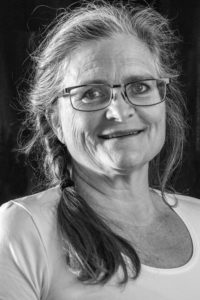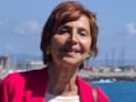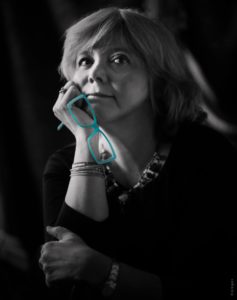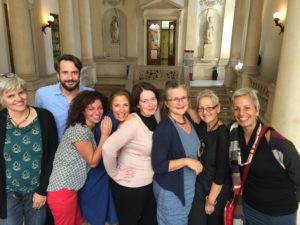The AGEMI team
Karen Ross is Professor of Gender and Media at Newcastle University, UK. Her teaching and research are focused on issues of gender, media and society including women and news and social media as political communication. She is the UK and European Coordinator of the Global Media Monitoring Project. She sits on the editorial boards of several journals and has held visiting positions at a range of universities, most recently as a Distinguished Visitor at Massey University, New Zealand 2018. She is the Managing Editor of a new Encyclopedia on Gender,

Media and Communication which will be published in 2020 by Wiley. Recent books include: Gender, Politics and Media (2017, Wiley); A Handbook of Gender, Sex and Media (2012, Wiley), The Media and the Public: Them and Us in Media Discourse (2010, Wiley-Blackwell) and Gendered Media (2009, Rowman and Littlefield).
Claudia Padovani is associate professor in Political Science and International Relation at University of Padova. She has been involved in international projects, including Mapping Global Media Policy, and conducts research on gender mainstreaming in media and ICT policies and communication governance. Claudia is co-chair of the Unesco UniTWIN Network on Gender Media and ICT.
Also involved with the AGEMI project in Padova are Cristina Paulon (project platform and online educational infrastructure development), Sergio Canazza and Edoardo Micheloni (Resource Bank and digital application development), Francesca Helm (online educational module support) and Naila Pratelli (Resource Bank support).
Maria Edström  is a Senior Lecturer at the Department of Journalism, Media & Communication (JMG), University of Gothenburg. Her field of research is gender, journalism, freedom of expression and ageing. She has been involved in several gender and media projects through the year, both on a national, Nordic and global level.
is a Senior Lecturer at the Department of Journalism, Media & Communication (JMG), University of Gothenburg. Her field of research is gender, journalism, freedom of expression and ageing. She has been involved in several gender and media projects through the year, both on a national, Nordic and global level.
Torbjörn Fraenckel is a member of the teaching staff at JMG, University of Gothenburg. He has a background as a documentary filmmaker and is a trained film producer. He has also worked as a consultant to the World Association of Newspapers with Web TV productions. Torbjörn is responsible for the Mojo sessions during the course.
Pamela Morinière is the European Federatation of Journalists(EFJ) gender expert as well as the International federation of Journalists’ head of Communications and campaigns. She is the author of several studies and publications on gender equality in the media and has coordinated a number of projects and campaigns to promote women’s rights in the media and gender GUESTportrayal in the news. European Federation of Journalists (BE)
Elena Chiaberge is in charge of gender equality and communication activities within COPEAM. She designs and coordinates workshops and projects at international level focusing on gender equality in the media: women empowerment within public broadcasters, elaboration of gender-related internal policies and development of professional practices in PSM. In the same domain, she organises training and production sessions for journalists and is the focal point in COPEAM in the framework of other EU-funded projects on gender and Media.
Conférence Permanente de l’Audiovisuel Méditerranéen (IT)
Sara De Vuyst is a Post Doc researcher at Ghent University and a visiting scholar at the University of Gothenburg. Her thesis from 2016 has the title : Hacking gender in journalism. Gender issues in the rapidly changing and digitalized field of news production and her Post Poc project is #Backlash. Exploring online harassment of journalists from an intersectional perspective.
Maria Sjögren is a PhD Student at JMG, the University of Gothenburg. She started in 2015 and has previously worked for the City of Gothenburg with citizen participation projects. In a broad sense the thesis also concerns public participation as a new and increasing mode of political communication. During the summer school she is mainly helping out with practicalities and logistics.
Helena Löfving is a member of the teaching staff at JMG, University of Gothenburg. She has a background from both television and newspapers, specializing in data journalism. Helena will assist Torbjörn in the Mojo sessions during the AGEMI summer school. During 2018 she worked as a communications officer at the Swedish Gender Equality Agency
GIULIA
Associate partner Gi.U.Li.A is an Italian association of women journalists working towards democracy and freedom of information, through promoting gender equality in the news media. They have professional experience and understand the specific challenges of gender stereotyping in the Italian context and will contribute to transnational exchange activities, including the summer school.
https://www.facebook.com/GIULIA-GIornaliste-Unite-LIbere-Autonome-138665822899005/

Luisella Seveso – Journalist – Degree in Foreign Languages and Modern Literature at Milano Statale University. After a few years as a TV journalist, I spent 25 years in a national daily newspaper dealing with a large range of social and cultural issues. I’m one of the GiULiA (Giornaliste Unite Libere Autonome) journalists, an association and a network that connects a thousand women journalists in all the Country. We make projects as “100 esperte”, a data base with the names of the most important Italian women scientists and economists to be used by the media for interviews in order to give them visibility. I’m one of the three creators.
Giovanna Pezzuoli, professional journalist since 1987, first at Il Giorno and then at Corriere della Sera, from 2000 to 2015, as vice editor and then as collaborator. She writes on the blog of the Corriere feminine, the 27th Hour, for which she also coordinated the book “This is not love” (2013). Among her latest works are the book “In Search of Mr Darcy” (2017), the collective book “Lady Frankenstein and the horrible progeny” (2018) which is curated with Luisella Seveso and the volumes “100 women against stereotypes for Science “and” 100 women against stereotypes for Economics “(2017 and 2018). She is one of the creators of the website www.100esperte.it, she is part of the national board of the GiULiA association (joint journalists, free, autonomous) and the editorial collective of the magazine Leggendaria.
volumes “100 women against stereotypes for Science “and” 100 women against stereotypes for Economics “(2017 and 2018). She is one of the creators of the website www.100esperte.it, she is part of the national board of the GiULiA association (joint journalists, free, autonomous) and the editorial collective of the magazine Leggendaria.
GUESTS
Maria Brändström is an editor and reporter at SVT Umeå in Sweden wh ere they have been counting heads and keeping track of representation in the news since 1998. Gender balance in journalism is an integrated part of their everyday work.
ere they have been counting heads and keeping track of representation in the news since 1998. Gender balance in journalism is an integrated part of their everyday work.
Claire Kendall has been a BBC Producer since 1994. She has worked with TV correspondents including Denis Murray, Richard Bilton and Marti n Bashir. She has worked on a range of stories including the 50th Anniversary of the first ascent of Everest to the Good Friday Agreement in Northern Ireland and the hunt for Raoul Moat. She is currently UK Affairs Producer and Original Journalism Champion for BBC Network News. She now produces social affairs pieces for the BBC 1 News at Ten which have been nominated for the Mind Media Awards and The Orwell Prize.
n Bashir. She has worked on a range of stories including the 50th Anniversary of the first ascent of Everest to the Good Friday Agreement in Northern Ireland and the hunt for Raoul Moat. She is currently UK Affairs Producer and Original Journalism Champion for BBC Network News. She now produces social affairs pieces for the BBC 1 News at Ten which have been nominated for the Mind Media Awards and The Orwell Prize.
Sa fia Kessas is a journalist, columnist and director of society documentaries related to youth, religious and community retreats. She is also responsible for Diversity and Equality at RTBF.
fia Kessas is a journalist, columnist and director of society documentaries related to youth, religious and community retreats. She is also responsible for Diversity and Equality at RTBF.
Suz anne Moll is one of the most experienced media leaders in Denmark. With a background of over 25 years in the ever changing media landscape, working as editor in chief and managing editor. She is a strong advocate for gender equality and diversity as a driver for change in media business, and has worked in media advisory projects in several continents (Southern Africa, Europe, Middle East, Asia).
anne Moll is one of the most experienced media leaders in Denmark. With a background of over 25 years in the ever changing media landscape, working as editor in chief and managing editor. She is a strong advocate for gender equality and diversity as a driver for change in media business, and has worked in media advisory projects in several continents (Southern Africa, Europe, Middle East, Asia).
Erica Hedin has a background in both television and radio, as reporter, producer and editor. She is currently covering political issues in Gothenburg and the Swedish election.
erica.hedin@sverigesradio.se
 Gunilla Ivarsson has many years of experience as journalist, producer, project leader and manager in Swedish radio. She is also the former chair of the global organization International Association of Women in Radio and Television, IAWRT.
Gunilla Ivarsson has many years of experience as journalist, producer, project leader and manager in Swedish radio. She is also the former chair of the global organization International Association of Women in Radio and Television, IAWRT.
The AGEMI project is co-funded by the Rights, Equality and Citizenship programme of the European Union.![]()





